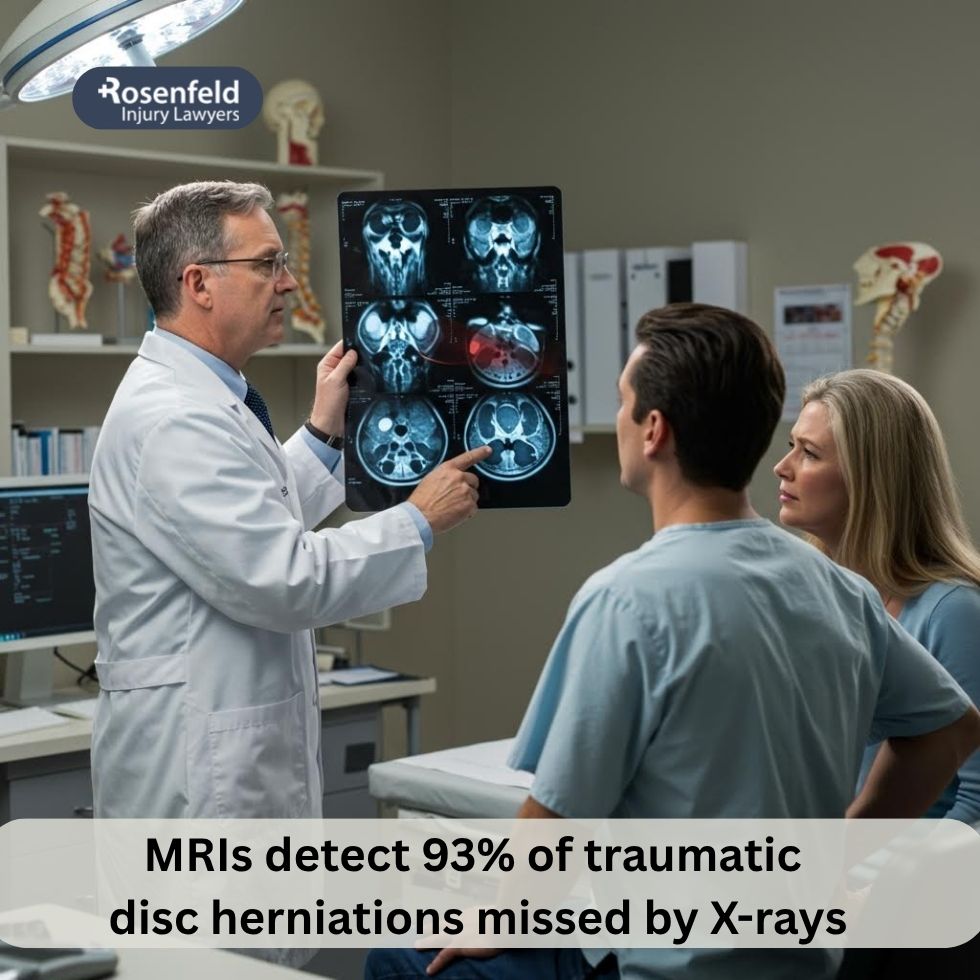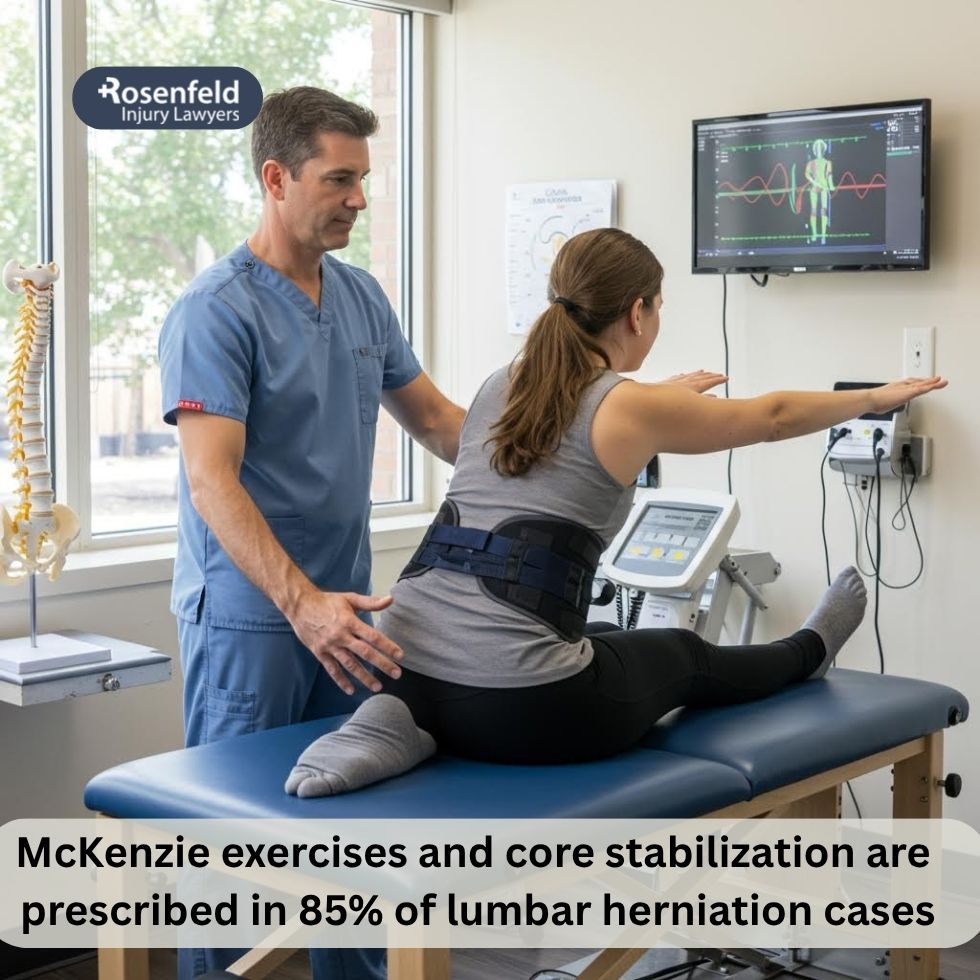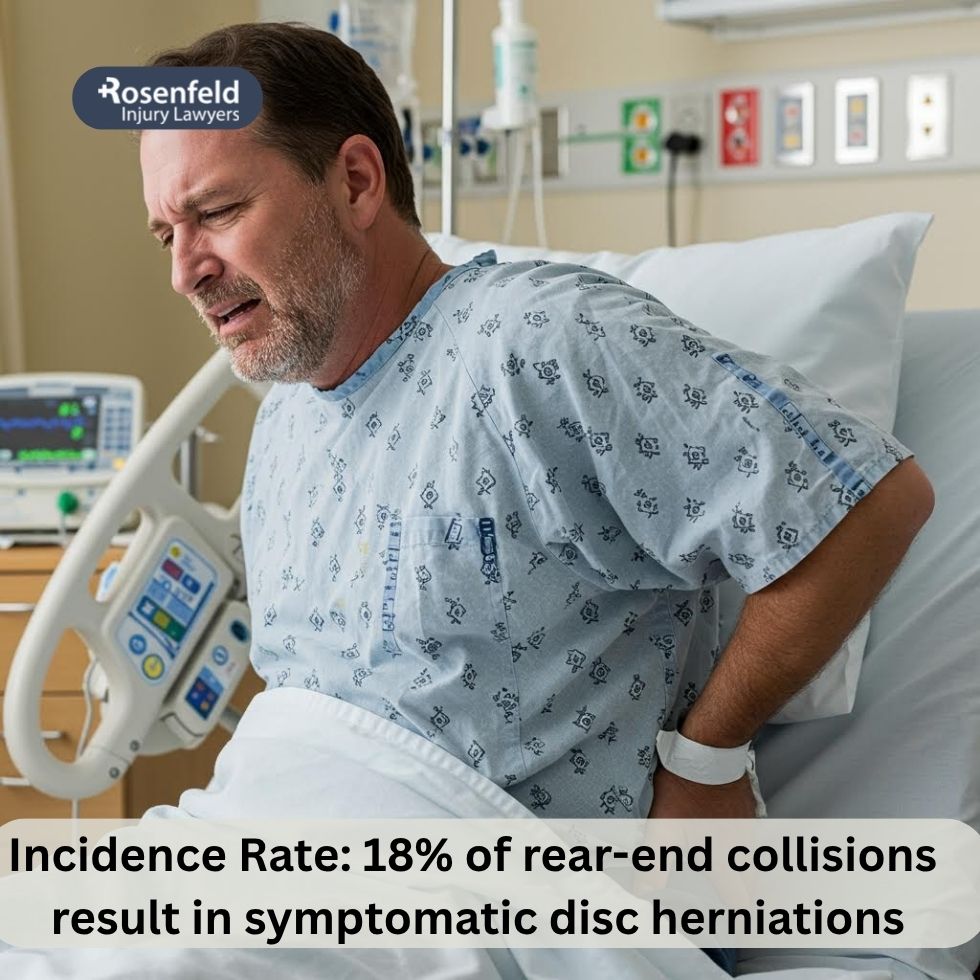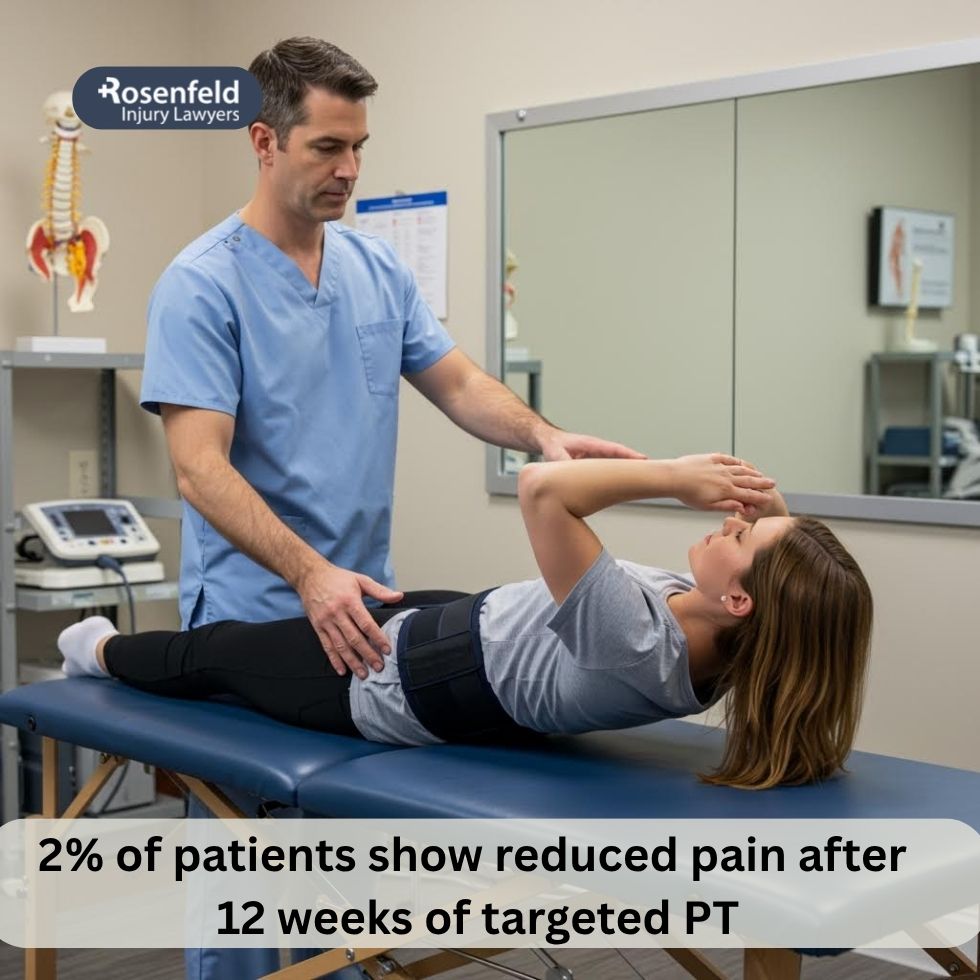- 24/7 Free Consultation: (888) 424-5757 Tap Here To Call Us
Herniated Disc Injury After a Car Accident
Herniated disc injury after a car accident can lead to debilitating pain, loss of mobility, and long-term medical complications. The force involved in car crashes often puts extreme stress on the spine, resulting in disc herniation, nerve compression, and other spinal injuries that may take months or even years to heal.
There are approximately 869,000 traffic-related cervical spine injuries treated in U.S. hospitals annually, with over 2,800 of these being spinal disk injuries. As you can see, motor vehicle accidents are one of the leading causes of herniated disc cases and related spinal cord trauma.
These injuries can affect your ability to work, perform daily activities, or enjoy life without chronic pain. Seeking prompt medical treatment and legal help is essential if you’ve suffered a herniated disc after a car accident. With the right care and legal strategy, you can pursue compensation for your losses.

What Is a Herniated Disc Injury?
To understand disc herniation, it helps to know how the spine is structured. The spinal column is made up of vertebrae cushioned by soft, gel-like pads known as intervertebral discs. These healthy discs act as shock absorbers, allowing the spine to move and flex.
Each disc has an outer layer called the annulus fibrosus, and an inner gel-like center called the nucleus pulposus. A slipped disc or a herniated disc occurs when the outermost layer tears or ruptures, allowing the inner material to protrude and press on nearby nerve roots or the spinal canal.
The spine is divided into five regions:
- Cervical spine (neck)
- Thoracic spine (mid-back)
- Lumbar spine (lower back)
- Sacrum
- Coccyx (tailbone)
Any section of the spine can be affected in an accident, but lumbar disc herniations and cervical spine injuries are the most common after a car accident.
How a Car Accident Can Cause a Herniated Disc
A herniated disc may result from the sudden force exerted on the body during a car accident. Even a minor injury can shift or rupture a spinal disc, especially if there is a pre-existing disc herniation.
High-speed car crashes or rear-end collisions can:
- Cause spinal compression from the seat belt restraint
- Trigger sudden torsion or flexion of the spine
- Lead to a ruptured disc or displacement
- Aggravate an existing bulging disc into a full herniation
In many cases, the impact from a car accident shifts the disc due to torque, forcing the herniated disc out of place and pressing against nerves. While airbags and seatbelts are lifesaving, they can also exert pressure on the back or neck and lead to injury, especially in high-impact crashes.

Symptoms of a Car Accident Caused Herniated Disc
Symptoms may not appear immediately after a herniated disc from a car accident. You may not feel pain at the scene, but develop increasing discomfort over the next few days.
Common symptoms of a herniated disc after a car accident include:
Chronic Pain and Discomfort
- Lower back or neck pain
- Limited mobility and difficulty bending or lifting
- Pain that worsens with movement or while sitting due to the herniated disc
Sciatic Nerve Pain
- Radiating leg pain that travels from the lower back down to the feet
- Tingling or numbness caused by compression of the sciatic nerve
You should seek medical assistance and get a free consultation with a lawyer if you suffer from any of these symptoms of a herniated disc after a car accident.
Neurological Symptoms
- Muscle weakness in the arms or legs
- Numbness, tingling, or burning sensations
- Loss of coordination or balance
If you experience these symptoms after a car accident, you should seek medical attention immediately.
Common Locations of Herniated Discs After a Car Accident
Disc Herniation in the Neck (Cervical Spine)
A herniated disc in the neck can compress nerves that control the entire nervous system in the upper body. You may experience:
- Pain in the shoulders, arms, and hands
- Weak grip strength
- Headaches and significant pain when turning the head
Herniated Disc in the Lower Back (Lumbar Spine)
The lumbar spine supports most of the body’s weight and is highly vulnerable. A lumbar disc injury may cause:
- Sciatic nerve pain and leg pain
- Pain when standing, sitting, or walking
- Difficulty sleeping due to discomfort
Bulging Disc in the Mid-Back (Thoracic Spine)
Less common but still serious, a bulging disc in the thoracic region can impact:
- Breathing and posture
- Core stability and muscle weakness
- Upper body mobility and spinal stenosis

Diagnosing a Herniated Disc
To have a herniated disc diagnosed, a medical professional may use a combination of the following:
- Physical examination to assess pain, reflexes, and mobility
- Diagnostic imaging such as X-rays, magnetic resonance imaging (MRI), or CT scans
- Electromyography (EMG) to measure nerve function and detect spinal cord issues
Proper diagnosis is critical to rule out other disc injuries or spine-related conditions.
Treatment Options for a Herniated Disc
Home Remedies and Non-Surgical Treatments
Initial treatment options may include:
- Rest and avoiding strenuous activities
- Posture correction to reduce strain
- Pain medication such as NSAIDs or muscle relaxants
Epidural Steroid Injections
Epidural steroid injections may be used to:
- Relieve pain and inflammation
- Reduce pressure on affected nerves
- Delay or avoid surgical intervention
They are especially helpful for patients who cannot tolerate surgery or need temporary relief.
Physical Therapy for Herniated Disc Recovery
A licensed physical therapist can help patients strengthen muscles, improve posture, and restore range of motion. Physical therapy is often used to:
- Support long-term healing
- Avoid re-injury
- Complement other non-invasive treatments
Chiropractic Care
Some patients benefit from spinal adjustments and decompression therapy. However, chiropractic care should be used cautiously and under medical supervision, especially if the disc herniation is severe.
Interventional Spine Treatment
Minimally invasive procedures may be offered at specialized clinics, combining imaging guidance, nerve blocks, and advanced pain control to manage herniated disc symptoms. These treatments are often recommended when conservative care has failed, but before considering a more invasive medical procedure.
Surgical Procedures for Severe Cases
If conservative treatments fail, spinal surgery may be necessary. Common surgical procedures include:
- Microdiscectomy: removal of part of the ruptured disc
- Spinal fusion: joining two vertebrae to stabilize the spinal column
- Artificial disc replacement: preserving mobility while replacing the damaged disc
Long-Term Effects of a Herniated Disc
Left untreated, a slipped or herniated disc can lead to:
- Ongoing pain and limited mobility
- Permanent nerve damage
- Emotional effects such as anxiety, depression, and isolation
- Reliance on pain medication
Even with medical treatment, some individuals face lifelong complications and must adapt their routines accordingly.

Proving Disc Herniation in a Legal Claim
If you’ve suffered a herniated disc due to someone else’s negligence, building a legal case requires detailed medical documentation. Your car accident lawyers will use the following:
- Medical records showing consistent treatment
- Accident scene evidence and police reports
- Expert medical testimony
- Testimony on your medical history and daily limitations
Clear, early documentation is essential—delays can allow insurance companies to dispute your injuries.
Seeking Compensation for a Herniated Disc After a Car Accident
Types of Compensation Available
Your legal team may pursue damages for:
- Medical bills, surgery, and ongoing physical therapy
- Lost wages and future earning losses
- Pain and suffering for physical and emotional distress
- Out-of-pocket costs like medical mileage
- Future care and long-term medical treatment
Challenges in Proving a Herniated Disc Claim
Insurance companies often challenge these claims using tactics like:
- Blaming a pre-existing disc herniation
- Downplaying a minor injury as unrelated
- Using gaps in care to suggest exaggeration
Our experienced car accident lawyers in Chicago can push back against these strategies and build a case grounded in facts.
How Illinois Laws Impact Your Claim
In Illinois, several laws affect your car accident injury claim:
- Statute of Limitations: You have two years from the date of the car accident to file a personal injury claim. (735 ILCS 5/13-202)
- Comparative Negligence: If you’re more than 50% at fault, you may not be eligible for compensation.
- No fault benefits: Illinois does not require no-fault coverage, meaning compensation depends on proving fault.
- Coverage minimums on insurance policies may limit recovery unless underinsured or uninsured motorist policies apply.
These legal standards highlight the need for an experienced attorney to navigate your case.
How an Experienced Attorney Can Help
A skilled car accident lawyer can help in the following ways with your car insurance claim:
- Investigate the crash and gather key evidence to build a strong case.
- Work with spine specialists and radiologists.
- Handle all communication with your auto insurance company.
- Negotiate for a fair settlement for your herniated disc pain and suffering.
- Represent you in court if needed.
With an experienced attorney on your side, you increase your chances of full financial recovery.
What Is the Average Payout for a Herniated Disc?
There is no one-size-fits-all amount for herniated disc car accident settlements, but typical car accident settlements range from:
- $20,000–$150,000 for mild to moderate disc injuries
- $100,000+ for multiple herniated discs, spinal surgery, or permanent impairment
However, we are able to deliver much higher settlements for our clients. While our average car accident settlement is currently at $8,141,667, we have recovered up to $18.5 million for a car accident victim.
The compensation you receive from an insurance claim for a herniated disc depends on a variety of different factors, including:
- Injury severity
- Length of treatment
- Impact on your life and ability to work
A strong claim backed by diagnostic imaging, medical documentation, and expert support can significantly improve the outcome of your claim. The right evidence helps your lawyers build a case that is difficult for the opposing insurance team to dispute.
Our Successful Spinal Cord Disc Herniation Settlements
Our firm has successfully secured significant settlements for clients who suffered a herniated disc after a car accident.
- We obtained $350,000 in a pre-litigation settlement for a backseat passenger who sustained a herniated cervical disc after being rear-ended at high speed.
- We also recovered $1,400,000 for a mother and daughter hit by a semi-truck while stopped at a red light—both suffered herniated discs, with the mother requiring spinal fusion surgery and the daughter treated with epidural steroid injections and physical therapy.
- Another client received $720,000 after being rear-ended by a double-trailer truck. Though initially told he had a back sprain, further testing revealed two herniated discs, leading to a three-level lumbar fusion.
- We secured $1,600,000 for a client who required fusion surgery following a herniated lumbar disc from a car accident. These outcomes highlight the serious nature of disc injuries and the compensation that victims may recover.
Get Legal Help for Your Herniated Disc From A Car Accident

If you’re dealing with a disc herniation after a car accident, don’t wait to get help. The severe pain and disruption to your life can be overwhelming, but legal guidance can ease the burden and help you move forward.
A car accident caused your injuries, and you shouldn’t have to fight insurance companies alone.
At Rosenfeld Injury Lawyers, our team is ready to help you understand your rights and pursue full compensation. Whether you’re suffering from a slipped disc, severe pain, or long-term mobility issues, we’ll work to show the crash caused a herniated disc and ensure your claim is taken seriously.
We offer a free consultation and never charge a fee unless we win your case.
Contact us today to speak with a Chicago car injury lawyer about your case and take the first step toward financial recovery and healing.
All content undergoes thorough legal review by experienced attorneys, including Jonathan Rosenfeld. With 25 years of experience in personal injury law and over 100 years of combined legal expertise within our team, we ensure that every article is legally accurate, compliant, and reflects current legal standards.







